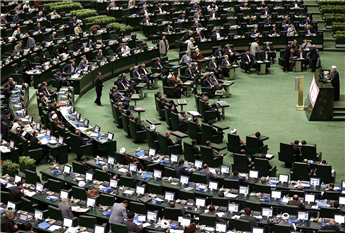Upped Terrorism and Inspection Ban are Both Iran Deal-Breakers
IBDEditorials.com

Iran’s parliament voted to
ban international inspectors access to its military
sites under any nuclear agreement. AP
Mideast: Tehran has increased its terrorist activities, the State Department finds, and the Iranian parliament just voted to prohibit key U.N. inspections. Either development by itself is enough to scuttle the nuclear talks.
If the proposed nuclear weapons deal between the P5+1, led by the U.S., and Iran happens, the lifting of sanctions will leave the world's leading terrorist state flush with many tens of billions of dollars in cash. We know what Tehran would do with that money: fund its network of terrorists.
The State Department's newly-released Country Reports on Terrorism 2014 found that Iran's regime has already stepped up aid to militias in Iraq, the Lebanese terrorist group Hezbollah (in direct violation of U.N. Security Council Resolution 1701 for nearly a decade), the Palestinian terrorist groups Hamas and Islamic Jihad, and Syria's long-standing terrorist regime.
The Obama administration's findings on Iran made it clear that this is the last country in the world that could be expected to keep an agreement. Tehran, it said, "continued subtle efforts at growing influence elsewhere including in Africa, Asia and, to a lesser extent, Latin America." Iran's Revolutionary Guard Corps Quds Force works to "create instability in the Middle East."
The report notes that in November, Iran's Supreme Leader, the Ayatollah Khamenei, "highlighted Iran's military support to 'Palestinian brothers' in Gaza and called for the West Bank to be similarly armed."
The next month, Hamas said that relations between itself and Iran were "back on track."
The State Department also pointed out how in March, Israel intercepted a freighter ship in the Red Sea off Sudan carrying "40 M-302 rockets, 180 mortars, and approximately 400,000 rounds of ammunition hidden within crates of cement labeled 'Made in Iran' and believed to be destined to militants in the region."
In addition, "Iran remained unwilling to bring to justice senior al-Qaida members it continued to detain, and refused to publicly identify those senior members in its custody."
But President Obama and Secretary of State John Kerry are bent on making a bad deal that gives wads of cash to a regime that not only is increasing its already massive terrorist operations, but a regime whose parliament on Sunday also voted to ban international inspectors access to its military sites under any nuclear agreement.
Some 199 of 213 members of the body voted in favor of the legislation. The U.N.'s International Atomic Energy Agency could "carry out conventional inspections of nuclear sites," the new law states, but "access to military, security and sensitive non-nuclear sites, as well as documents and scientists, is forbidden."
What if it turns out that one of those other sites is engaged in nuclear weapons activity or holds clues to Tehran cheating?
Either of these two pieces of news is more than enough reason for the U.S. to walk away from the negotiations. Those who face us across the table are recalcitrant terrorist-masters who have no intention of giving up their quest for nukes.
This president, however, is not about to walk
away. It's a legacy thing; we wouldn't understand.

